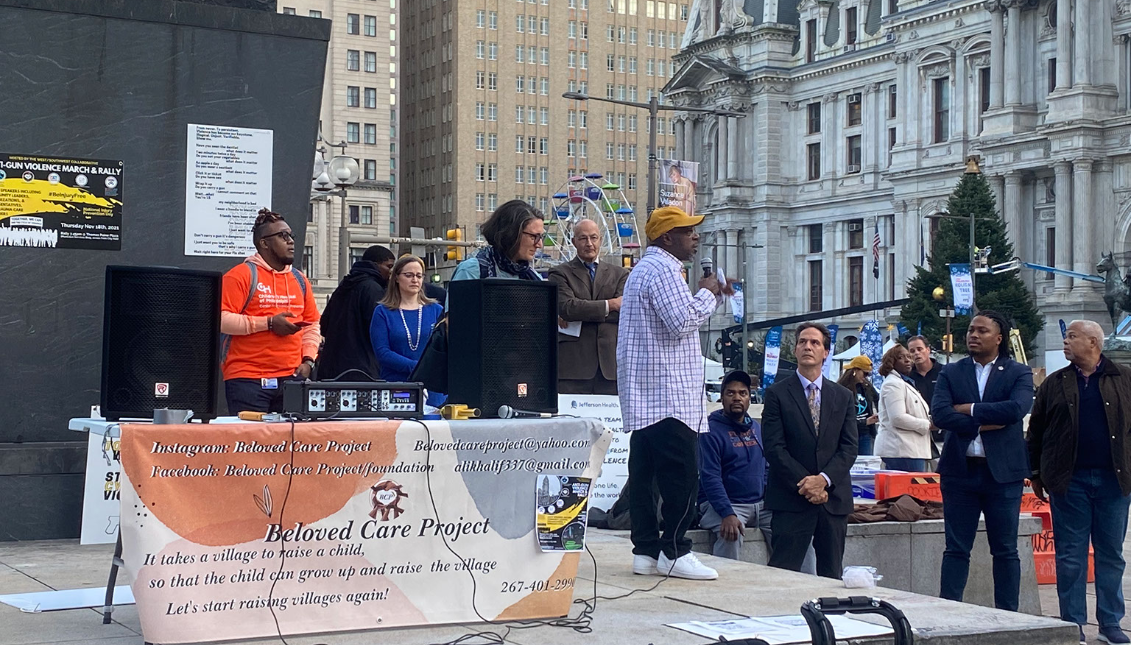
Philly gun violence rally puts emphasis on the need for action over anymore words
The march and rally, which took place on National Injury Prevention Day, featured a number of community and civic leaders demanding change.
On Thursday, Nov. 17, community leaders, elected officials, and trauma care specialists from Penn Medicine, Jefferson Hospital, and Penn Injury Science Center, gathered for National Injury Prevention Day to march and rally against the city’s gun violence epidemic.
The crowd walked from 30th Street Station and completed the march at Thomas Paine Plaza, where the rally began. The march was led by the West Powelton Steppers and Drum Squad, a group that often performs at anti-gun violence rallies.
Tomorrow, #NationalInjuryPreventionDay (11/18): Join CVP, @Penn, @philadao, the Beloved Care Project, @AVPPhila, & community leaders for an Anti-Gun Violence March & Rally hosted by the West/Southwest Collaborative. The march starts at 3PM - View flyer for details. #BeInjuryFree pic.twitter.com/9rY70YADIl
— CVPatCHOP (@CVPatCHOP) November 17, 2021
Participants held signs with photos and names of loved ones they lost to gun violence. Trauma care specialists held signs with daunting statistics about victims of gunshot wounds.
Khalif Mujahid-Ali, founder of the nonprofit organization, Beloved Care Project, started the rally by holding a moment of silence for all those that have lost their lives to gun violence.
Mujahid-Ali has lost family members of his own to the crisis, and he hung a poster around his neck that showed their pictures. But he made it clear that his work and this event is not just about his loss, but about the losses of the collective and the dire need for change.
“We gotta get solutions. We’re gonna see that there are solutions. Because we have to hear from the people that go through this every day. We have to listen to the children, we have to listen to the teenagers,” he said.
Mujahid-Ali then introduced Glenn Bryan, an Assistant Vice President at the University of Pennsylvania, representing Penn Medicine.
“Gun violence is a pandemic. It’s killing us. It’s happening all over the city. How much more of this can we take?” Bryan asked the crowd.
The crowd then responded “no more,” multiple times.
“The only way we’re going to solve this is if we all work together. It’s everybody’s problem. This is the beginning of what we can call a marathon. We’re gonna keep coming out and we’re gonna reclaim our community,” Bryan said.
Elinore Kaufman, MD, MSHP, a trauma surgeon at Penn Medicine, took the mic to talk about her experiences at her job. Kaufman said that she loves taking care of people who are injured, and being a small part of the team that supports healing.
RELATED CONTENT
“But I cannot tell you how much I wish that we didn’t have to do it so often. I would like to do the fun parts and not the parts where I’m meeting people on the worst days of their lives when I’m delivering the worst possible news to families,” Kaufman said.
Next, participants heard from City Controller Rebecca Rhynhart.
“The violence isn’t happening in a vacuum. Gun violence is a racial justice issue, and I think we need to acknowledge that...that it’s occurring in the poorest neighborhoods across our city, from decades and decades of disadvantage. These are facts and I think it’s really important to say this as fact: that gun violence is coming from racist policies,” Rhynhart said.
Rebecca Rhynhart- Philadelphia City Controller “this violence is not okay, and we need to do everything to stop this” #ALDIALIVE pic.twitter.com/YjfJmxyyTD
— AL DÍA Live (@ALDIALive) November 18, 2021
Mujahid-Ali then brought two high school girls to the stage to share their experiences with the epidemic. The first student said that she felt safer during the height of the pandemic during online school than she does now, due to the violence.
The last person to speak was PA state rep and U.S. Senate candidate Malcolm Kenyatta, who started off his remarks saying: “I am so sorry that we are here.”
“The hard reality is that we already know what we need to do. Your presence here is, what it does, is it helps build the political will to hopefully actually get it done,” Kenyatta said.
“We could deal with this tomorrow. We don’t need more ideas. We need action.” @malcolmkenyatta on #politicalwill to address the long term injustice and #EndGunViolence @PennInjury pic.twitter.com/FKaglXKHyG
— Elinore J. Kaufman (@ElinoreJKaufman) November 18, 2021
Kenyatta listed several solutions including making it easier for formerly incarcerated people to reenter society, and making it more difficult for people to access guns.
“So what I hope you take out of your presence here today is that we build the will to get these good ideas done. We don’t need any more ideas. God knows what we need is some action,” he said.











LEAVE A COMMENT: